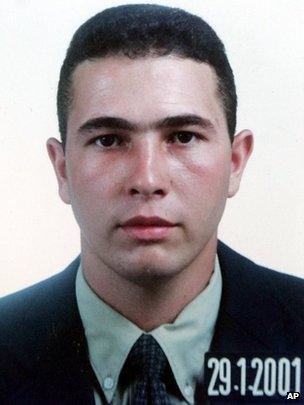Metropolitan Police gathered information on 18 family campaigns
- Published

The Met Police collected information on 18 justice campaigns - including that of Jean Charles de Menezes - a report into a now defunct unit has said.
Campaigns for two men shot dead by mistake in London - Mr Menezes and Harry Stanley - were among those targeted, the BBC understands.
Operation Herne - which reported back on the Special Demonstration Squad - cited a failure of senior management.
The Met said it regretted "enormously" the distress caused.
In his report into undercover operations, Operation Herne's lead Derbyshire Chief Constable Mick Creedon said undercover police had gathered information relating to 18 families and campaigns for justice over the course of 35 years.
He said his review had found the campaigns were "mentioned" in records held by the Metropolitan Police's - now disbanded - SDS.
'Collateral intrusion'
Mr Creedon told BBC Radio 4's World at One programme the information gathered by SDS was "never, ever direct spying or undercover activity against these very peaceful, legitimate campaign groups".
The information was "collateral intrusion", he said.
Asked if he was certain no spying took place, he said: "It would have been completely against what the SDS was there for - it was there to try and stop protest and try and make sure the capital was a safer place to live in."
Chief Constable Mick Creedon: "Report makes disturbing but reassuring reading... there were not covert attacks against families"
The campaigns, from 1970 to 2005, were the result of deaths in police custody, deaths following contact with the police - including two shootings - and people who had been murdered.
Claims that police were instructed to find information that could discredit the family of murdered teenager Stephen Lawrence have already been investigated.
The latest report has not named which campaigns were the subject of information gathering, but the BBC understands they include:
- Jean Charles de Menezes - shot dead when he was mistaken for a suicide bomber in 2005
- Harry Stanley - mistakenly shot dead by police in 1999
- Ricky Reel - campaigners say police failed to properly investigate his 1997 suspicious death
The report said the majority of campaigns reported on by the SDS "involved black males".
In each of these cases and others, Scotland Yard had come under intense media and community pressure amid allegations that police officers were not being held to account for alleged failings.
The lawyer for the Menezes family said she had been informed by the Met that information was gathered on them after the Brazilian's death.
They said the information was "very upsetting" and an "absolute disgrace to know the police were spying on us after everything we've been through".
They are considering legal action against Scotland Yard, they said.
'Felt sick'
It comes after the mother of Ricky Reel, found dead after a suspected racist attack in 1997, told BBC News she had been informed by an officer from Operation Herne that police had gathered intelligence on her in 1998 and 1999.
She called for a public inquiry into the spying claims, and told the BBC: "This was happening at a time we were feeling very low, we should have been left alone to grieve for our son, instead of being spied upon.
"As soon as I heard it, the room started spinning and I felt sick."
Mr Creedon said the gathering of information was "unavoidable" because undercover SDS officers were targeting groups that were seeking to align themselves with the campaigners or were present at meetings when information was shared.
Sukhdev Reel tells 5 live: "I'm shocked, I'm hurt"
But he said: "Unless the information could have prevented crime or disorder it should not have been retained."
Mr Creedon said it would be "distressing" for bereaved families to learn that the details were held, adding "this must seem inexplicable".
Assistant Commissioner Martin Hewitt, from Scotland Yard, said: "I regret enormously the distress that has been caused."
The report said: "It is quite clear that maintaining the secrecy of the unit and protecting the identity of the officers was of paramount importance to all involved - and in being so focused on this aspect the management of the SDS, of the Metropolitan Police Special Branch and ultimately the Metropolitan Police Executive Leadership of the day collectively failed."
'No notebooks'
The report said senior Met management either "knew nothing" about the SDS's existence or, if they did, they appeared to have allowed it to "exist in secret isolation in a manner that was complacent and possibly negligent".
Undercover officers did not use notebooks, and passed on information wholesale to bosses that was then kept in its entirety.
The report questioned why it was retained if it "provided no operational benefit in targeting crime or preventing disorder".
It said a number of former SDS officers said they received no training over what information they could or could not gather and did not work to national guidelines.
"Their internal operating philosophy was... effectively unchallenged," it said.
The report said there were several families who have not yet been contacted, and more may emerge as time goes on.
The investigation is expected to go on for another year and will report on the culture of the unit and "some behaviour that was not appropriate".
- Published23 July 2014
- Published24 June 2013
- Published24 June 2013